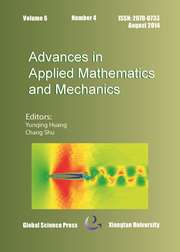Article contents
Structure-Preserving Wavelet Algorithms for the Nonlinear Dirac Model
Published online by Cambridge University Press: 18 January 2017
Abstract
The nonlinear Dirac equation is an important model in quantum physics with a set of conservation laws and a multi-symplectic formulation. In this paper, we propose energy-preserving and multi-symplectic wavelet algorithms for this model. Meanwhile, we evidently improve the efficiency of these algorithms in computations via splitting technique and explicit strategy. Numerical experiments are conducted during long-term simulations to show the excellent performances of the proposed algorithms and verify our theoretical analysis.
MSC classification
- Type
- Research Article
- Information
- Copyright
- Copyright © Global-Science Press 2017
References
- 2
- Cited by


